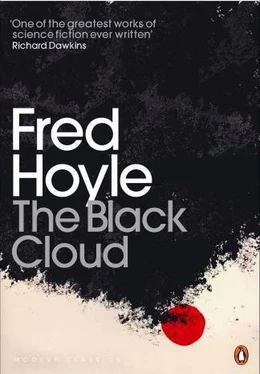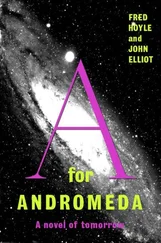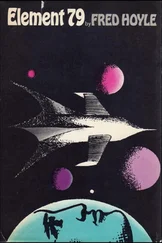Fred Hoyle - The Black Cloud
Здесь есть возможность читать онлайн «Fred Hoyle - The Black Cloud» весь текст электронной книги совершенно бесплатно (целиком полную версию без сокращений). В некоторых случаях можно слушать аудио, скачать через торрент в формате fb2 и присутствует краткое содержание. Жанр: Фантастика и фэнтези, на английском языке. Описание произведения, (предисловие) а так же отзывы посетителей доступны на портале библиотеки ЛибКат.
- Название:The Black Cloud
- Автор:
- Жанр:
- Год:неизвестен
- ISBN:нет данных
- Рейтинг книги:5 / 5. Голосов: 1
-
Избранное:Добавить в избранное
- Отзывы:
-
Ваша оценка:
- 100
- 1
- 2
- 3
- 4
- 5
The Black Cloud: краткое содержание, описание и аннотация
Предлагаем к чтению аннотацию, описание, краткое содержание или предисловие (зависит от того, что написал сам автор книги «The Black Cloud»). Если вы не нашли необходимую информацию о книге — напишите в комментариях, мы постараемся отыскать её.
The Black Cloud — читать онлайн бесплатно полную книгу (весь текст) целиком
Ниже представлен текст книги, разбитый по страницам. Система сохранения места последней прочитанной страницы, позволяет с удобством читать онлайн бесплатно книгу «The Black Cloud», без необходимости каждый раз заново искать на чём Вы остановились. Поставьте закладку, и сможете в любой момент перейти на страницу, на которой закончили чтение.
Интервал:
Закладка:
“Isn’t there an element of tautology there?’ — from Weichart.
“I said that words such as “animate” and “inanimate” are only verbal conveniences. If they’re pushed too far they do appear tautological. In more scientific terms I expect the chemistry of the interior of the Cloud to be extremely complicated — complicated molecules, complicated structures built out of molecules, complicated nervous activity. In short I think the Cloud has a brain.”
“A dam’ straightforward conclusion,” nodded Alexandrov.
When the laugh had subsided, Marlowe turned to Kingsley.
“Well, Chris, we know what you mean, at any rate we know near enough. Now let’s have your argument. Take your time. Let’s have it point by point, and it’d better be good.”
“Very well then, here goes. Point number one, the temperature inside the Cloud is suited to the formation of highly complicated molecules.”
“Right! First point to you. In fact, the temperature is perhaps a little more favourable than it is here on the Earth.”
“Second point, conditions are favourable to the formation of extensive structures built out of complicated molecules.”
“Why should that be so?’ asked Yvette Hedelfort.
“Adhesion on the surface of solid particles. The density inside the Cloud is so high that quite large lumps of solid material — probably mostly ordinary ice — are almost certainly to be found inside it. I suggest that the complicated molecules get together when they happen to stick to the surfaces of these lumps.”
“A very good point, Chris,” agreed Marlowe.
“Sorry, I don’t pass this round.” McNeil was shaking his head. “You talk of complicated molecules being built up by sticking together on the surface of solid bodies. Well, it won’t do. The molecules out of which living material is made contain large stores of internal energy. Indeed the processes of life depend on this internal energy. The trouble with your sticking together is that you don’t get energy into the molecules that way.”
Kingsley seemed unperturbed.
“And from what source do the molecules of living creatures here on the Earth get their internal supplies of energy?’ he asked McNeil.
“Plants get it from sunlight, and animals get it from plants, or from other animals of course. So in the last analysis the energy always comes from the Sun.”
“And where is the Cloud getting energy from now?”
The tables were turned. And as neither McNeil nor anyone else seemed disposed to argue, Kingsley went on:
“Let’s accept John’s argument. Let’s suppose that my beast in the Cloud is built out of the same sort of molecules that we are. Then the light from some star is required in order that the molecules be formed. Well, of course starlight is available far out in the space between the stars, but it’s very feeble. So to get a really strong supply of light the beast would need to approach close to some star. And that’s just what the beast has done!”
Marlowe became excited.
“My God, that ties three things together, straight away. The need for sunlight, number one. The Cloud making a bee-line for the Sun, number two. The Cloud stopping when it reached the Sun, number three. Very good, Chris.”
“It is a very good beginning, yes, but it leaves some things obscure,” Yvette Hedelfort remarked. “I do not see,” she went on, “how it was that the Cloud came to be out in space. If it has need of sunlight or starlight, surely it would stay always around one star. Do you suppose that this beast of yours has just been born somewhere out in space and has now come to attach itself to our Sun?”
“And while you’re about it, Chris, will you explain how your friend the beast controls its supplies of energy? How did it manage to fire off those blobs of gas with such fantastic speed when it was slowing down?’ asked Leicester.
“One question at a time! I’ll take Harry’s first, because its probably easier. We tried to explain the expulsion of those blobs of gas in terms of magnetic fields, and the explanation simply didn’t work. The trouble was that the required fields would be so intense that they’d simply burst the whole Cloud apart. Stated somewhat differently, we couldn’t find any way in which large quantities of energy could be localized through a magnetic agency in comparatively small regions. But let’s now look at the problem from this new point of view. Let’s begin by asking what method we ourselves would use to produce intense local concentrations of energy.”
“Explosions!’ gasped Barnett.
“That’s right, explosions, either by nuclear fission, or more probably by nuclear fusion. There’s no shortage of hydrogen in this Cloud.”
“Are you being serious, Chris?”
“Of course I’m being serious. If I’m right in supposing that some beast inhabits the Cloud, then why shouldn’t he be at least as intelligent as we are?”
“There’s the slight difficulty of radioactive products. Wouldn’t these be extremely deleterious to living material?’ asked McNeil.
“If they could get at the living material, certainly they would. But although it isn’t possible to produce explosions with magnetic fields, it is possible to prevent two samples of material mixing with each other. I imagine that the beast orders the material of the Cloud magnetically, that by means of magnetic fields he can move samples of material wherever he wants inside the Cloud. I imagine that he takes very good care to keep the radioactive gas well separated from the living material — remember I’m using the term “living” for verbal convenience. I’m not going to be drawn into a philosophical argument about it.”
“You know, Kingsley,” said Weichart, “this is going far better than I thought it would. What I suppose you would say is that whereas basically we assemble materials with our hands, or with the aid of machines that we have made with our hands, the beast assembles materials with the aid of magnetic energy.”
“That’s the general idea. And I must add that the beast seems to me to have far the better of it. For one thing he’s got vastly more energy to play with than we have.”
“My God, I should think so, billions of times more, at the very least,” said Marlowe. “It’s beginning to look, Chris, as if you’re winning this argument. But we objectors over here in this corner are pinning our faith to Yvette’s question. It seems to me a very good one. What can you offer in answer to it?”
“It is a very good question, Geoff, and I don’t know that I can give a really convincing answer. The sort of idea I’ve got is that perhaps the beast can’t stay for very long in the close proximity of a star. Perhaps he comes in periodically to some star or other, builds his molecules, which form his food supply as it were, and then pushes off again. Perhaps he does this time and time again.”
“But why shouldn’t the beast be able to stay permanently near a star?”
“Well, an ordinary common or garden cloud, a beastless cloud, if it were permanently near a star, would gradually condense into a compact body, or into a number of compact bodies. Indeed, as we all know, our Earth probably condensed at one time from just such a cloud. Obviously our friend the beast would find it extremely embarrassing to have his protective Cloud condense into a planet. So equally obviously he’ll decide to push off before there’s any danger of that happening. And when he pushes off he’ll take his Cloud with him.”
“Have you any idea how long that will be?’ asked Parkinson.
“None at all. I suggest that the beast will push off when he’s finished recharging his food supply. That might be a matter of weeks, months, years, millennia for all I know.”
Читать дальшеИнтервал:
Закладка:
Похожие книги на «The Black Cloud»
Представляем Вашему вниманию похожие книги на «The Black Cloud» списком для выбора. Мы отобрали схожую по названию и смыслу литературу в надежде предоставить читателям больше вариантов отыскать новые, интересные, ещё непрочитанные произведения.
Обсуждение, отзывы о книге «The Black Cloud» и просто собственные мнения читателей. Оставьте ваши комментарии, напишите, что Вы думаете о произведении, его смысле или главных героях. Укажите что конкретно понравилось, а что нет, и почему Вы так считаете.












